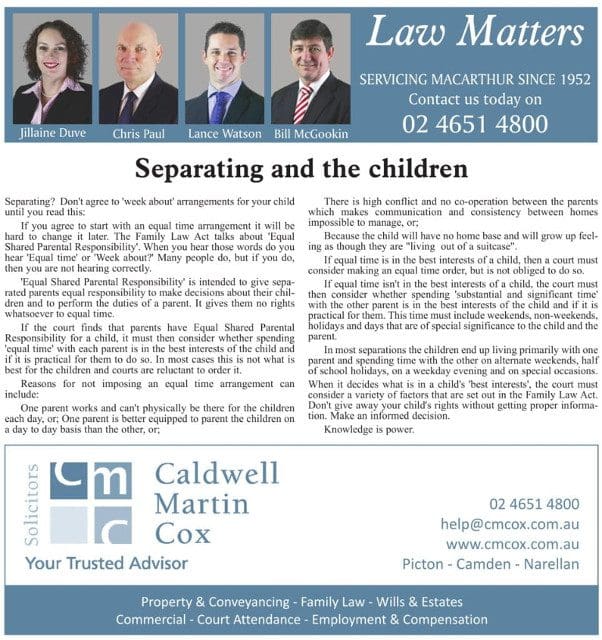Separating? When you hear the term ‘Equal Shared Parental Responsibility’ do you hear ‘Equal time’ or ‘Week about’? Think again. Here’s another great article in our series with The District Reporter. Serving our Community.
Find a full copy of The District Reporter here: www.tdr.com.au
Separating? Don’t agree to ‘week about’ arrangements for your child until you read this:
If you agree to start with an equal time arrangement it will be hard to change it later. The Family Law Act talks about ‘Equal Shared Parental Responsibility.’ When you hear those words do you hear ‘Equal time’ or ‘Week about?’ Many people do, but if you do, then you are not hearing correctly.
Equal Shared Parental Responsibility is intended to give separated parents equal responsibility to make decisions about their children and to perform the duties of a parent. It gives them no rights whatsoever to equal time.
If the court finds that parents have Equal Shared Parental Responsibility for a child, it must then consider whether spending ‘equal time’ with each parent is in the best interests of the child and if it is practical for them to do so. In most cases this is not what is best for the children and courts are reluctant to order it.
Reasons for not imposing an equal time arrangement can include:
-
One parent works and can’t physically be there for the children on weekdays; the parents live too far apart to parent the children on a day to day basis than the other, or
-
There is high conflict and no co-operation between the parents which makes communication and consistency between homes impossible to manage, or
-
Because the child will have no home base and will grow up feeling displaced and “living out of a suitcase.”
If equal time is not ordered, then the court is required to consider making an order for substantial and significant time.
Substantial and significant time involves a mixture of weekends, weekdays and days that fall on special occasions such as birthdays and holidays that allows a parent to be involved in the child’s daily routine and special events. This allows for both parents to be involved in supporting the child’s development and limits time spent and spending time with the child on special weekends.
In most instances, the children are simply unable to mentally or emotionally adjust to living between two different homes on a ‘week about’ basis. One size or variety may not suit, and yet the Family Law Act doesn’t give a checklist of how to get it right.
Knowledge is power.




